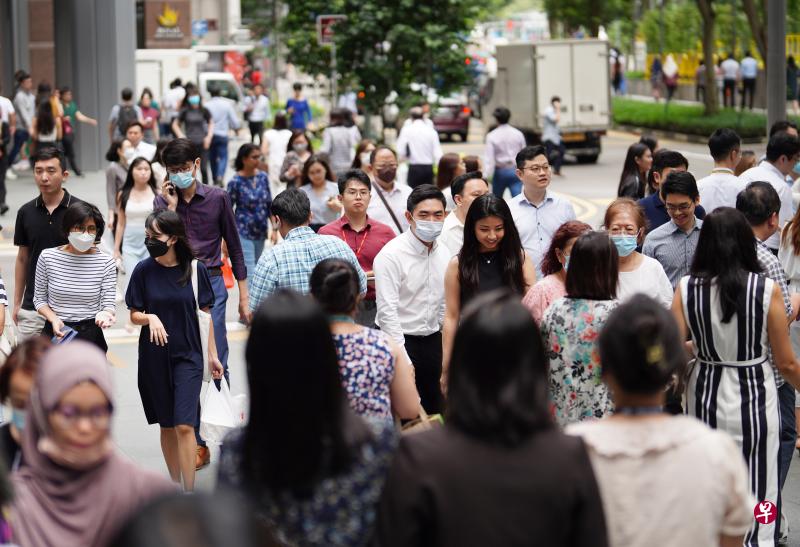
March 1, 2023
The overall fertility rate of residents (citizens and permanent residents) in Singapore in 2022 fell to a record low, only 1.05, which is far from the internationally recognized population replacement rate 2.1.Although the government has spared no effort to encourage the people of the people, it still cannot reverse the disadvantages.In the past 12 years, the fertility rate has not passed the level of 1.29.
Low fertility rate, coupled with rapid population aging, will restrict Singapore's economic development.Therefore, in addition to increasing efforts to encourage the birth of the Chinese, the government also actively attracts new immigrants to fill the gap.Last year, about 23,100 people obtained citizenship, and about 34,500 foreign people became permanent residents.In comparison, there were only more than 35,700 new babies in Singapore last year.
The continuous low fertility rate of residents has increased the proportion of new immigrants.In August last year, Huang Yonghong, the Minister of Defense, revealed at the Congress that 20%of the recruits of the national service were permanent residents and new citizens.This is much higher than 5%20 years ago.He said that without these new citizens and permanent residents, the impact of low fertility rate on the human demand for armed forces would be even more serious.
The superior geographical environment and political stability in Singapore, coupled with the global finance, trade and transportation hubs, have always been international cities collected by funds and talents.Global geopolitical contradictions have intensified and the control of crown disease in many countries has made more wealthy people and high -end talents looking for safely for themselves and their children.This is a golden opportunity for Singapore to attract foreigners and new immigrants.
In 2021, the funds flowing into Singapore reached 448 billion yuan, an increase of 60 % over 2020.In addition, the number of family wealth management offices (referred to as home office) located locally, from about 400 at the end of 2020 to about 700 at the end of 2021.It is estimated that as of the end of last year, the households have doubled, reaching more than 1,400.
Like many society that attracts immigrants, the influx of new immigrants has caused some Chinese anxiety, including the competition of work, changes in population structure, and how to integrate.
Monday (February 27), the opposition leader Bi Danxing, the Minister of Communications and the Minister of Communications and the Second Minister of the Ministry of the Interior Yang Liming launched a debate on the approval standards of citizenship and permanent resident rights in Congress.
Bi Danxing takes the selection procedure of citizenship issued by Switzerland as an example. It is required that the government requires applicants for citizenship and permanent residents to pass the English test.Yang Liming did not agree to use well in English as the selection criteria.She pointed out that what the government considers citizenship or permanent residents is the family relationship, residence time, and whether applicants and Singaporeans are studying or completing national service in public schools.These are evaluated with the economic contribution, qualifications and age of applicants.
This confrontation highlights the integration of new immigrants and their impact on the population structure.Fusion is a two -way transportation. It depends on the new immigrant to actively understand and accept the values and social norms of Singapore, and strengthen their connection with the community.Singapore should not only be regarded as a shelter that provides passports, convenient travel, and parking funds. It must also be the new home of new immigrants.
At the same time, the locals responded to the new immigrant attitude and accepted them to become a member of Singapore.This helps strengthen the recognition of new immigrants in Singapore, especially their second generation.
Among the new waves of new immigrants, there are more wealthy people and high -end talents.In September last year, Huang Xuncai, the Deputy Prime Minister and Minister of Finance, pointed out at the first global -Asian Family Financial Office Summit that wealthy people who set up home -to -house were not only investors, but also important partners in national construction.They should promote the inclusive growth of Singapore by supporting local innovative enterprises, promoting climate transformation and strengthening the development of charity.
Under the atmosphere of the global rich and poor gaps and high inflation, new immigrants of wealthy people and high -end talents need to avoid showing off their wealth, so as not to cause the general public and extraordinarity.At this moment, Huang Xuncai proposed an inclusive growth at the family -run summit, which is of great significance.
On the other hand, for many years, one -third of Singapore's annual citizenships are foreign citizens.This ratio has declined during the epidemic, but it is believed that in the post -epidemic era, the ratio of transnational marriage will rise.In addition, alien marriage accounts for about 16%of citizenship.The impact of transnational marriage and alien intermarriage on the population structure of traditional CMIOs (Chinese, Malay, India, and others) may also change the content of Singapore's identity.
Singapore is one of the hubs of global trade, investment and transportation.As an international metropolis, it must be kept open, accepting funds and talents.At the same time, Singapore is a small projectile country, consolidating its identity, which is essential for its survival and development.A certain tension often appears between open cities and national identity.How to get a dynamic balance between the two should be one of the focus of the new social contract.


